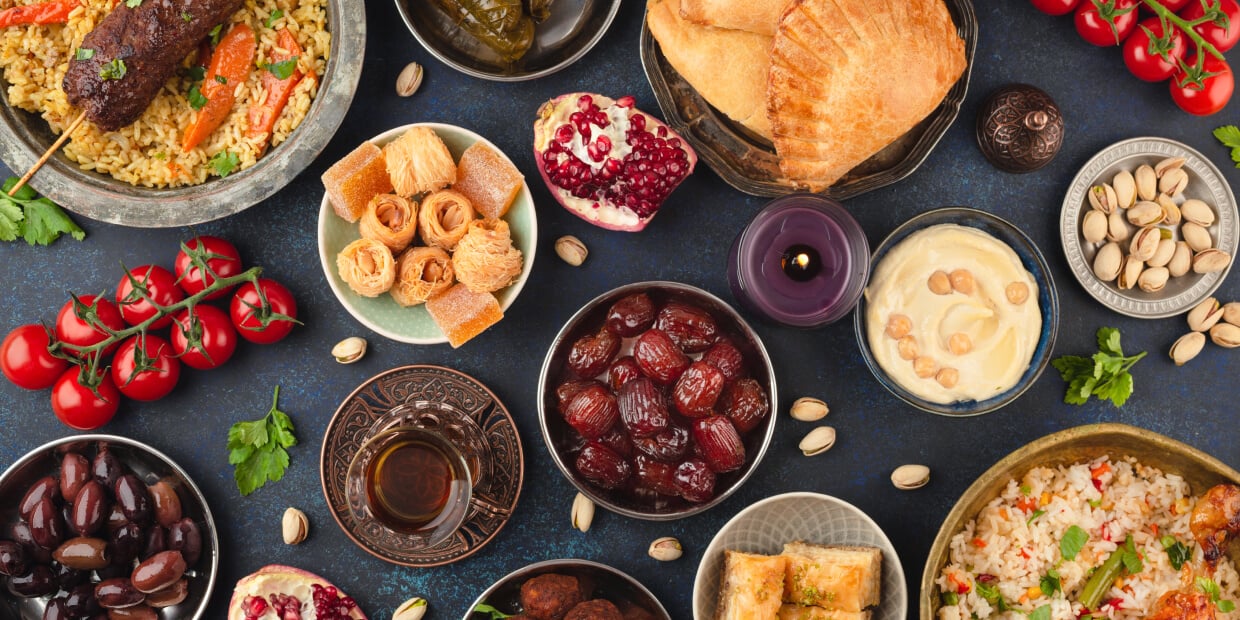Over the past decade, the halal food market itself has experienced a significant expansion. Once considered a niche, the halal food market is now worth more than $2 trillion.
This surge in popularity and demand has led to a remarkable transformation of the F&B landscape – with the rise of healthy halal food emerging as a significant trend.
As we take a closer look into this trend, it’s clear that the expansion of the halal food market is reshaping consumer preferences and opening new avenues for businesses.
Read More: How is Halal Certification Shaping International Food Standards
Contents
- 1 Expansion of Halal Food Market
- 2 Is Halal Food Healthy?
- 3 3 Consumer Trends Driving the Popularity of Healthy Halal Food
- 4 Opportunities of Tapping the Healthy Halal Food Market
- 5 5 Step Guide to Penetrating the Healthy Halal Food Market
- 6 The Future Looks Bright
- 7 Get in Touch
- 8 Featured Insights
- 9 Get in Touch
Expansion of Halal Food Market
The halal food market has been on an upward trajectory, fueled by a growing Muslim population – which is currently around 2 billion. Once primarily associated with Muslim-majority countries, halal food is now a global phenomenon.
Did You Know: Between 2010 and 2050, the population size of Muslims is projected to grow 73%.
The global halal food market has particularly seen substantial expansion over the past decade, with the global halal food market estimated to reach a value of $3 trillion by 2026. This growth can be attributed to 3 key factors:
- Increasing Muslim Population: The global Muslim population is growing steadily, leading to a higher demand for halal products. This growth has also presented a significant market for halal-certified exports.
- Rise in Disposable Income: In recent decades, there has been a noticeable increase in disposable income among Muslim communities. This financial upliftment has allowed Muslim consumers to increase spending on premium and high-quality halal-certified food products.
- Non-Muslim Consumers: Halal food is not limited to Muslims; non-Muslim consumers are also embracing it due to its perceived quality, safety, and ethical standards. This inclusivity has led to a broader acceptance and appreciation of halal food, further driving its popularity
Is Halal Food Healthy?
Halal food, conforming to Islamic laws, emphasizes ethical treatment and humane slaughtering of animals, cleanliness in processing, and the prohibition of alcohol and certain additives. While “halal” signifies religious compliance, these practices can align with healthier, cleaner eating by ensuring fresh, well-handled meat free from harmful substances.
3 Consumer Trends Driving the Popularity of Healthy Halal Food
The rise of healthy halal food is backed by an increasing awareness of the importance of nutrition, wellness, and dietary choices, driving a shift towards healthier eating habits among all consumers.
Here are 3 main consumer trends driving the rise of health halal food:
1. Ethical Consumption
Consumers today are more conscious of where their food comes from. They want to support businesses that prioritize ethical practices, including animal welfare and sustainable sourcing.
Halal certified food ensures that ethical standards are met. By choosing halal-certified products, consumers can be assured that their food has been obtained and prepared in accordance with the ethical guidelines on 2 billion halal consumers.
2. Clean Label Movement
The clean label movement emphasizes transparency in food ingredients. Halal products adhere to strict guidelines regarding additives, preservatives, and processing methods, aligning perfectly with the clean label ethos.
As consumers are increasingly demanding to know more about the foods they eat, seeking products free from artificial ingredients and harmful chemicals, halal-certified clean-label food products are now particularly more appealing to health-conscious consumers
3. Nutritional Awareness
Halal consumers often emphasizes whole foods, fresh ingredients, and balanced nutrition. As people become more health-aware, they have started to appreciate the wholesome nature of halal cuisine.
This nutritional awareness associated with halal-certified food products has further contributed to the popularity of healthy halal food among health-conscious individuals who are seeking not only flavorful food but also meals that nourish their bodies.
Opportunities of Tapping the Healthy Halal Food Market
Businesses can capitalize on the healthy halal food trend in several ways – here are 3 ways:
- Menu Diversification: Restaurants and cafes can expand their menus to include more halal options. By incorporating healthy halal options in their menus, restaurants and cafes can attract health-conscious consumers who are seeking halal-certified food.
- Product Development: Food manufacturers can also create innovative halal products that cater to health-conscious consumers. This also opens doors for collaborations with supermarkets, online food delivery platforms, and other distribution channels.
- Export Opportunities: With the global demand for halal products, businesses can also explore international markets. By capitalizing on Muslim export markets, businesses can cater to the growing Muslim population in regions such as GCC and South Asia.
Read More: Halal Certification for Export to UAE, Saudi Arabia, and GCC/MENA Countries
5 Step Guide to Penetrating the Healthy Halal Food Market
Penetrating the healthy halal food market and obtaining halal certification are crucial steps for businesses looking to cater to this growing segment. Here is a 5-step guide on how to penetrate the healthy halal food market:
- Understand the Market: Begin with thorough research to understand the demographics, preferences, and needs of the halal consumer. This includes not just the religious aspects but also the health, ethical, and consumer loyalty trends that influence purchasing decisions.
- Develop the Right Product: Create products that meet the halal criteria while also appealing to the health-conscious consumer. This could mean sourcing organic ingredients, ensuring no cross-contamination with non-halal products, and emphasizing nutritional benefits.
- Build Trust through Certification: Halal certification is non-negotiable for Muslim consumers. Therefore obtaining it from a recognized authority not only ensures compliance but also builds trust with your target audience.
- Market Appropriately: Tailor your marketing strategies to highlight the halal and healthy aspects of your products. Use platforms and channels that are popular among your target demographic. Cultural sensitivity and authenticity in your marketing efforts are key.
- Leverage E-commerce and Social Media: Online sales and social media platforms are powerful tools for reaching and engaging with the modern halal consumer market, especially the younger, tech-savvy generation.
How to Get Halal Certification
To penetrate the healthy halal food market, obtaining halal certification is crucial. Here are the steps to get halal certification from the American Halal Foundation (AHF):
- Step 1- Prepare Your Facility: Ensure that your food facility and processes align with AHF’s halal standards. This includes segregating halal and non-halal ingredients and implementing proper hygiene and sanitation practices.
- Step 2- Application and Documentation: Complete the application process by submitting the necessary documentation, including ingredient lists, processing methods, and proof of compliance with halal standards.
- Step 3- Halal Inspection and Audit: AHF’s Account Executive will then conduct an inspection of your facility to ensure compliance with halal standards. Your processes will also be verified to ensure they adhere to the halal requirements.
- Step 4- Certification Decision: After the inspection and audit, AHF will review your application and inspection report to make a certification decision. If approved, you will be granted halal certification.
- Step 5- Compliance and Ongoing Monitoring: Once certified, you must maintain compliance with the halal standards. Regular audits and inspections may be conducted to ensure continued adherence to the requirements.
Read More: The Detailed Halal Certification at AHF
The Future Looks Bright
The future looks bright for the healthy halal food industry, with ample opportunities for growth, collaboration, and innovation.
As the F&B industry continues to evolve, healthy halal food is here to stay, catering to the diverse needs of consumers and enriching the culinary landscape.
The growth of the healthy halal food market is set to continue, reshaping the F&B landscape in profound ways.
Get in touch with our experts at the American Halal Foundation (AHF) to help you tap into the rise of halal food with our internationally recognized halal certification.
Interested in learning more? Check out more of our industry-based insights here.
Get in Touch
Connect with a halal certification expert.








